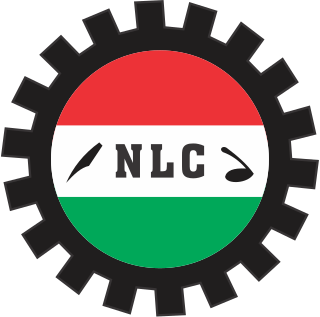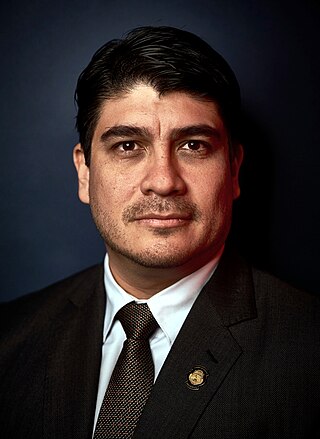
The politics of Costa Rica take place in a framework of a presidential, representative democratic republic, with a multi-party system. Executive power is exercised by the president and their cabinet, and the President of Costa Rica is both the head of state and head of government. Legislative power is vested in the Legislative Assembly. The president and 57 Legislative Assembly deputies are elected for four-year terms. The judiciary operates independently from the executive and the legislature, but is involved in the political process. Costa Rica has a strong system of constitutional checks and balances. Voting is compulsory de jure, but this is not enforced.

The Nigeria Labour Congress (NLC) is an umbrella organization for trade unions in Nigeria.

The Citizens' Action Party is a political party in Costa Rica.

Carlos Alfonso Ortega Carvajal is a former union and political leader in Venezuela. Ortega, then head of Fedepetrol, the oil workers union, was elected leader of the Confederación de Trabajadores de Venezuela (CTV) union federation in 2001. He played an important role during the Venezuelan general strike of 2002–2003, resulting in a 16-year prison term. Ortega ultimately escaped from prison on 13 August 2006.

The Costa Rican Civil War took place from 12 March to 24 April 1948.

Lesbian, gay, bisexual, and transgender (LGBT) rights in Costa Rica have evolved significantly in the past decades. Same-sex sexual relations have been legal since 1971. In January 2018, the Inter-American Court of Human Rights made mandatory the approbation of same-sex marriage, adoption for same-sex couples and the removal of people's sex from all Costa Rican ID cards issued since October 2018. The Costa Rican Government announced that it would apply the rulings in the following months. In August 2018, the Costa Rican Supreme Court ruled against the country's same-sex marriage ban, and gave the Legislative Assembly 18 months to reform the law accordingly, otherwise the ban would be abolished automatically. Same-sex marriage became legal on 26 May 2020.
Same-sex marriage has been legal in Costa Rica since May 26, 2020 as a result of a ruling by the Supreme Court of Justice. Costa Rica was the first country in Central America to recognize and perform same-sex marriages, the third in North America after Canada and the United States, and the 28th to do so worldwide.

Christianity is the predominant religion in Costa Rica, with Catholicism being its largest denomination. Catholicism is also the state religion, but the government generally upholds people's religious freedom in practice.

The history of Bangladesh (1971–present) refers to the period after the independence of Bangladesh from Pakistan.
Abortion in Costa Rica is severely restricted by criminal law. Currently, abortions are allowed in Costa Rica only in order to preserve the life or physical health of the woman. Abortions are illegal in almost all cases, including when the pregnancy is a result of rape or incest and when the foetus suffers from medical problems or birth defects. Both social and economic factors have led to this legal status. It remains unclear whether abortions are legal to preserve the mental health of the woman, though the 2013 United Nations abortion report says Costa Rica does allow abortions concerning the mental health of a woman.
Trade unions in Costa Rica advocate for the rights of workers in Costa Rica. Dating back to the late 1800s, labor unions in the country have been a political force. They remain active in political and social life for many Costa Ricans.

The Constitution of Costa Rica is the supreme law of Costa Rica. At the end of the 1948 Costa Rican Civil War, José Figueres Ferrer oversaw the Costa Rican Constitutional Assembly, which drafted the document. It was approved on 1949 November 7. Several older constitutions had been in effect starting from 1812, with the most recent former constitution ratified in 1871. The Costa Rican Constitution is remarkable in that in its Article 12 abolished the Costa Rican military, making it the second nation after Japan to do so by law. Another unusual clause is an amendment asserting the right to live in a healthy natural environment.

Carlos Andrés Alvarado Quesada is a Costa Rican politician, writer, journalist, and political scientist who served as the 48th president of Costa Rica from 8 May 2018 to 8 May 2022. A member of the Citizens' Action Party (PAC), Alvarado previously served as Minister of Labor and Social Security during the presidency of Luis Guillermo Solís.

Since Emmanuel Macron was elected President of France on 7 May 2017, a series of protests have been conducted by trade union activists, left-wing activists and right-wing activists in opposition to what protesters consider to be neoliberal policies and globalism, his support of state visits by certain world leaders, his positions on French labour law reform, as well as various comments or policy proposals he has made since assuming the presidency.

Referendums in Costa Rica are regulated by law. The main juridical body that regulates is the Law of Referendum or Law 8492. To this date the only nation-wide referendum done since the current Constitution and the afore mentioned referendum regulatory law is in place was the 2007 Costa Rican Dominican Republic – Central America Free Trade Agreement referendum.

The 2018 Nicaraguan protests began on 18 April 2018 when demonstrators in several cities of Nicaragua began protests against the social security reforms decreed by President Daniel Ortega that increased taxes and decreased benefits. After five days of unrest in which nearly thirty people were killed, Ortega announced the cancellation of the reforms; however, the opposition has grown through the 2014–2018 Nicaraguan protests to denounce Ortega and demand his resignation, becoming one of the largest protests in his government's history and the deadliest civil conflict since the end of the Nicaraguan Revolution. On 29 September 2018, political demonstrations were declared illegal by President Ortega.

The Dictatorship of the Tinoco brothers, also Tinochist or Peliquist Dictatorship, or Tinoco regime is the period of Costa Rica in which the military dictatorship led by Federico Tinoco Granados as de facto president and his brother José Joaquín Tinoco Granados as Minister of War was in place. It began after the 1917 Costa Rican coup d'état on January 27, 1917, and culminated with the departure of Tinoco from Costa Rica to France on August 13, 1919 three days after the murder of his brother and after a series of armed insurrections and massive civil protests known as the Sapoá Revolution and the 1919 student civic movement.

General elections were held in Costa Rica on 6 February 2022, to elect the president, two vice-presidents, and all 57 deputies of the Legislative Assembly. As none of the presidential nominees obtained at least 40% of the votes, a runoff was held on 3 April 2022, between the top two candidates, José María Figueres and Rodrigo Chaves Robles.

Rodrigo Alberto de Jesús Chaves Robles is a Costa Rican politician and economist who is the 49th and current President of Costa Rica since 2022. He was previously Minister of Finance from 2019 to 2020 during the presidency of Carlos Alvarado Quesada.














